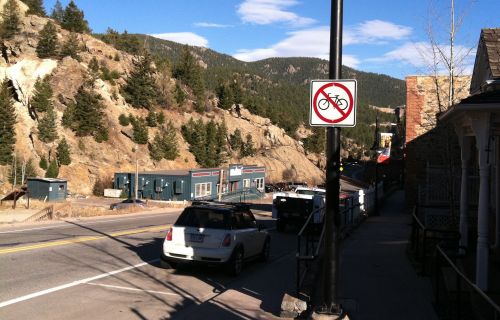DENVER, CO (BRAIN) — The "No Bicycles" signs will be coming down in Black Hawk, Colorado, after the state's highest court overturned a lower court ruling and said the mountain town must allow bikes on its main drag.
The town, best known for its casinos, had banned bikes on one two-lane road, citing safety concerns. Three out-of-town cyclists who were fined for violating the ban challenged it, ultimately taking the case to the Colorado Supreme Court, where justices heard arguments in November.
Lawyers for the cyclists pointed to a state law that said cyclists can not be banned from roads where there is no nearby alternate route.
Lawyers for the town said a safety study found that bikes and auto traffic could not safely coexist on the road, and that the mountainous geography made an alternate route impossible. They also said the town was a "home-rule" municipality, meaning it could set its own traffic laws.
But in an opinion released Monday, the Supreme Court said home-rule municipalities could only set traffic laws with matters "purely of local concern." Citing bicycling's benefits to the state and the state legislature's efforts to encourage the activity, the court said Black Hawk must comply with the state law and allow bikes on the road.
The opinion noted that Black Hawk's ban had a ripple effect outside the community.
"Bicyclists migrate to our state roadways and mountain towns in the summer and autumn months in search of recreation and scenery. The ordinance effectively closes off the neighboring town of Central City from receiving bicycle traffic on connected routing of long-distance bicycle rides and may also affect a bicyclist’s decision to visit other mountain towns, such as Nederland, that benefit from recreational tourism. In 2011, the Bicycle Tour of Colorado, a bicycling event hosting 1,500 national and international bicyclists, was forced to shuttle riders through Black Hawk from its starting and ending location in Central City. That event specifically avoided Black Hawk because of the ordinance."
The opinion was written by Justice Gregory Hobbs, who seemed receptive to the cyclists' arguments during the oral arguments, at one point fondly recalling his own days delivering newspapers by bike. In the opinion, Hobbs even demonstrated an understanding of the challenges of walking in road cleats.
Though Black Hawk emphasizes that the ordinance only prohibits bicycling on city streets and does not prohibit walking bicycles along Black Hawk sidewalks and roadways, the nature of long-distance bicycling equipment (such as rigid, awkward shoes with large plastic cleats) does not lend itself to walking bicycles for moderate distances and may discourage bicyclists from including Central City on their routes.
Hobbs' opinion said that Black Hawk can "regulate" — but not ban — bicycle traffic within its borders and remanded the case to the lower court.




